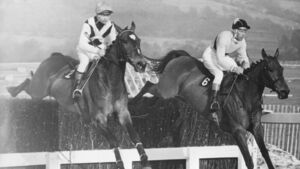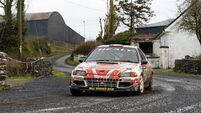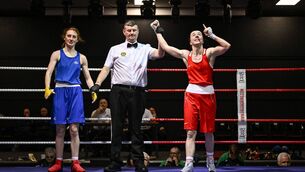There’ll never be another quite like Arkle

Jockey Pat Taaffe and Arkle, right, jump a fence just ahead of G.W. Robinson and Mill House in the 1965 Cheltenham Gold Cup at Prestbury Park.
On March 7, 1964, Irish minds were all drifting in one direction – across the Irish Sea. Though Ireland and Wales were competing in an intensely competitive contest in the Six Nations at Lansdowne Road, the minds of even those at the game were elsewhere. The public imagination had been well and truly captured.
Indeed, the loudest cheer of the day in Dublin 4 greeted news from elsewhere. As word emerged from the tannoy that Arkle had beaten Mill House, the terraces roared in delight. Whatever was happening on the pitch, the Irish pretender had travelled to Cheltenham and beaten the English powerhouse, who was regarded as the best racehorse in the game at the time. Racing wasn't – and still isn't – everyone's cup of tea, but the entire country was anticipating the 1964 Cheltenham Gold Cup like it was the moon landing.
Never has this small country been so consumed by a racehorse – and it perhaps never will again.
A year previous, Arkle won the Broadway Novices’ Chase, now more commonly known as the Brown Advisory Novices' Chase, at the Festival. By then, the Irish had already taken notice of the up-and-coming Tom Dreaper-trained star. In those days, the Irish weren't the dominant force at Prestbury Park that they are today – but Arkle was still heavily fancied and he didn't disappoint. The favourite accelerated up the famous Hill to record an eye-catching 20-length victory. It was clear that he was made for the Cotswolds venue. No other novice could live with him. He was, without question, now en route to becoming the most famous sports star in Ireland. The only question left to be answered was the height of his ceiling.
But two days later, his future rival entered the same arena and romped home to a 12-length victory in the Gold Cup, the sport's blue riband. And Mill House seemed to have it all – the powerfully-built frame that could pull a half-dozen ploughs, the stamina of a war horse that could carry a burly general across Europe, the impeccable temperament of a creature that saw jumping a fence as its one true purpose. While Arkle may have beaten all before him so far in his career, Mill House was being justifiably embraced as possibly the best of all time.
The duel was inevitable from the end of the 1963 Festival, and they finally met for the first time in the Hennessy Gold Cup at Newbury later that year. As many had expected, Mill House dominated his rival who was only stepping up into open company. Though the Gold Cup winner handed him five pounds he still won handily, a late blunder by Arkle seeing him demoted to third place on the day.
Arkle nevertheless learned from the experience and Dreaper began preparing him for a return to Cheltenham a few months later. Despite Arkle’s eye-catching efforts at the same venue the previous March, Mill House was the clear favourite heading into the 1964 renewal of the Gold Cup. And for good reason. But while most credible opposition avoided taking on the reigning champion, Arkle took his place in the race to set up the most anticipated match-up of the century.
Neither of the other runners in the race had poor reputations by any metric. Pas Seul had won the Gold Cup in 1960 and King's Nephew was, until that point, the only horse to have beaten Mill House between the flags. But everyone was still in agreement – this was a two-horse race. And that's exactly how the race panned out.
The contest appeared all but over as the pair met the turf after jumping the third fence from the finish. Mill House jumped it better and it was beginning to look like the racing public were in for a repeat of the Newbury race. But by the time the pair had reached the penultimate fence, Arkle was upsides once again. The champion was suddenly in trouble as they jumped the fence. Arkle had found an exceptional stride, and landed as if the Cotswolds turf was as springy as a trampoline. Mill House was beginning to look beatable as Arkle brought him to terra incognita.
Coming up the famous hill, Arkle kept finding more and eventually left the reigning champion in his contrails. That said, it was a very commendable performance in defeat from Mill House who finished clear of the rest of the field. It was abundantly obvious, even then, that the attendance had been treated to two of the best horses to ever jump a fence. It was a rivalry for the ages.
But it would be Arkle who would go on to change the game. A month later, Arkle went on to compete in the Irish Grand National carrying top weight. And that still wasn't enough to level the playing field. The Gold Cup winner forced the handicapper to alter how he assigned ratings – in fact, the handicapper needed two systems, a separate one for when Arkle was in the field. When Arkle won the Irish Grand National, he carried 30 pounds more than his rivals. He had rapidly developed into a horse that could overcome any challenge – an awkward landing, a doughty rival, an unforgiving handicapper.
Sixty years on, the 1964 Gold Cup remains the greatest duel of all time. Arkle remains the highest rated horse of all time, with a Timeform rating of 212. Mill House is among the top five horses of all time, according to Timeform, with a rating of 191. For context, today's highest horse is Gold Cup favourite Galopin Des Champs who has a mark of 181.
When the pair met in the 1965 Gold Cup, Arkle reasserted his dominance with a 20-length win. And as Arkle secured a famous third Gold Cup the following year, Mill House missed the race through injury. Before the English horse had a chance to enact revenge upon his comeback, Arkle had been forced into retirement through injury.
It didn't matter though. For in their 1964 meeting in the Gold Cup, they both achieved immortality. And for those who were lucky enough to witness it, either in-person and through a wireless, the moment is branded in their memories.
Everyone knows where they were when the news came through that Arkle achieved the impossible.





